James Alexander Watson, Ottawa city councillor 1991–97, Member of Provincial Parliament 2003–10, mayor of Ottawa 1997–2000 and 2010–22, journalist, broadcaster (born 30 July 1961 in Montreal, QC). Jim Watson has been in and out of politics since he was first elected as an Ottawa city councillor in 1991. He has also served as a member of the Ontario parliament (MPP) and as a minister in the Liberal Cabinet. He came out as gay in 2019 and served four terms as mayor of Ottawa. He was both the youngest and the longest-serving mayor in the city’s history.
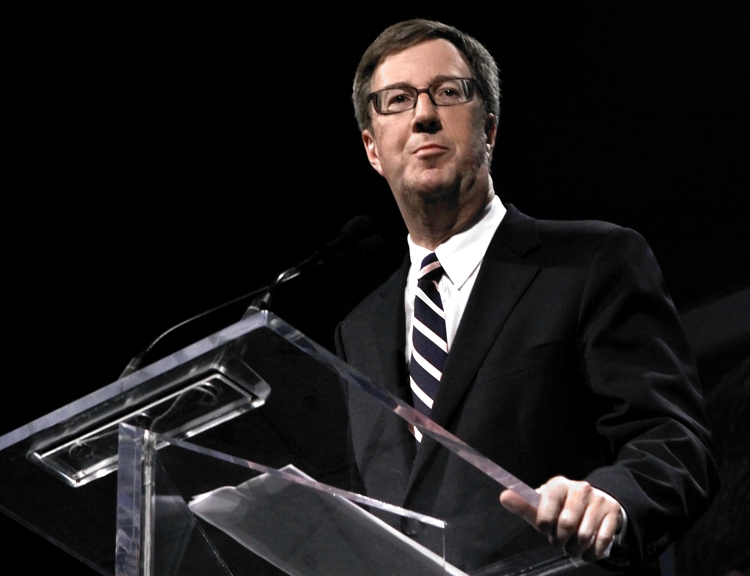
Early Life
Jim Watson was born in Montreal to father Bev and mother Frances Watson. He was raised in Lachute, Quebec, with his parents and older sister, Jayne. They lived there until 1976.
Politics was not part of Watson’s early career plans. “At one point I was going to be a religious minister,” he has said. “As a kid, my father was the superintendent for [our Presbyterian] Sunday school. I went to Sunday school and was inspired by our minister.” That career choice died, he jokingly added, because “I really didn't enjoy getting up Sunday mornings.”
As a young boy in Lachute, Watson hoped to become a newspaper reporter. He bought a small printing press and started his own newspaper. Later, as a teenager living in Toronto, he contacted a local TV station about the idea of hosting a youth show. “The next week they contacted me and said,'Sure.' I guess the bar was not set very high! And instead of just asking you know, the librarian or the chief of police on the show, I was getting celebrities – I had Al Waxman, Mr. Dressup, Arnold Palmer,” Watson said.
In 1980, he moved to Ottawa, where he earned a Bachelor of Arts in communications at Carleton University. He graduated three years later with an eye to becoming a reporter. After several rejection letters, Watson instead began working as an information officer with the federal department of supply and services. He eventually served in the offices of the Speaker of the House of Commons and sports minister Otto Jelinek.
Ottawa City Council
In 1991, Jim Watson was elected as an Ottawa city councillor in Capital ward. He campaigned against council's flip-flops, tax increases and cuts to city services. He established himself as a fiscal conservative, and often butted heads with then-mayor Jacquelin Holzman.
Watson made a mark in his first term by teaming up with fellow councillor Peter Hume to restore and save the Cattle Castle, a heritage building at Lansdowne Park. Today, the Cattle Castle is considered one of the gems of the revamped Lansdowne Park fair and sports grounds, hosting community events throughout the year.
Watson also garnered attention for his opposition to a concert featuring rock bands Guns N' Roses and Metallica at Lansdowne Park. Just 30 years old at the time, he was described as a “veteran old fogie” for resisting any easing of the city's noise bylaw past 11:00 p.m., which concert organizers had requested. The public's pushback against the bylaw won the day, however. The bands were allowed to play, although the concert was subsequently cancelled for unrelated reasons.
In 1994, Watson won his second term on council.
First Term as Mayor
Three years later, Jim Watson became the city's youngest mayor at the age of 36. He was elected with 82 per cent of the popular vote. He won the race on a platform of amalgamating Ottawa with surrounding municipalities. This was carried out by the end of his term with the support of Mike Harris’s provincial Conservative government.
However, in the lead-up to the 2000 municipal election, Watson unexpectedly decided not to run for re-election. While he said he needed a change, many believed he was influenced by polls showing his opponent Bob Chiarelli headed toward victory.
Work Outside Politics
Jim Watson was soon appointed president and CEO of the Canadian Tourism Commission, a federal crown corporation. He quickly left that job for a position as co-anchor of local TV station CHRO. He also started writing a weekly column at the Ottawa Citizen newspaper. But he soon returned to politics, this time at the provincial level.
Provincial Politics
Given Watson’s fiscal conservatism, many observers considered him a natural fit with the Conservative Party. Instead, he entered provincial politics under the Liberal banner. In 2003, he was elected to the Ontario legislature for Ottawa West-Nepean. He was immediately appointed to Cabinet as Minister of Consumer and Business Services. Two years later, he became Ontario's first Minister of Health Promotion. In this role, he successfully implemented the Smoke Free Ontario Act.
Re-elected in 2007, Watson was promoted to Minister of Municipal Affairs and Housing. The following year, he signed a significant federal-provincial housing agreement. Once again, however, Watson didn't finish his term. He quit provincial politics to attempt a return to the mayor’s office in Ottawa.
Second Term as Mayor
In 2010, Jim Watson beat mayoral incumbent Larry O'Brien, who had a tumultuous four years in office. Watson's second mayoralty was dominated by the development of light rail transit (LRT) in Ottawa, the redevelopment of Lansdowne Park, and his pledge to keep tax increases within the rate of inflation. Known as a mayor who attended every bake sale and envelope opening in the city, Watson spent much of his free time attending community and charity events. He was also a keen user of social media.
During this period, Watson entertained plans to develop a new downtown casino. But when it became clear that he lacked support from both the public and council, he backed down. He instead endorsed the proposed expansion of the Rideau-Carlton Raceway. In 2012, he also tried to redraw Ottawa's ward boundaries and cut the size of city council, but again could not marshal enough support from council.
Third Term as Mayor
When he ran for re-election in 2014, Watson faced little opposition. He won with 76 per cent of the vote, up from the 49 per cent he received in 2010.
Watson had a reputation as an affable but controlling mayor, with a desire to keep members of his council in line with his agenda, sometimes by limiting public debate. He was also criticized for giving excessive power to his suburban-based allies (informally called the “Watson club”) through appointments to key committees.
Watson also organized several special events in 2017 — with Ottawa hosting the Juno Awards and the Grey Cup, among other things — to celebrate the 150th anniversary of Confederation.
Fourth Term as Mayor
In October 2018, Watson won his fourth mayoral race, this time with 71 per cent of the vote. The following summer, he published an op-ed in the Ottawa Citizen in which he came out as gay. “I’m gay,” he wrote. “There – I said it; or rather, wrote it. Those two words took me almost four decades to utter, but as they say, ‘Better late than never.’’’
In September 2019, Watson celebrated the opening of a new light rail transit (LRT) route, the Confederation Line or the “O-Train,” which had been under construction for over six years. However, it immediately encountered technical problems and experienced long delays. Watson was criticized extensively for the delays and problems. Vehicle doors were easily damaged by riders, onboard computers malfunctioned, and the trains often broke down in cold weather. By early 2022, the city and its contractors were suing each other and the provincial government had initiated an inquiry into the system’s problems.
In 2020, Watson announced plans to build a new joint Ottawa Public Library and Library and Archives Canada site in downtown Ottawa. Watson’s fourth term faced considerable difficulties, however. In March 2020, with several confirmed cases of COVID-19 in Ontario and Quebec, Watson declared a state of emergency and closed all municipal facilities. From 1 April until 18 May, the government of Quebec locked down its borders to limit the flow of people into the province. This meant that checkpoints were established on each of the five bridges connecting Ottawa to neighbouring Gatineau. One year later, amid a new wave of cases, authorities reestablished the checkpoints, blocking all recreational travel. Ottawa city council was relatively proactive in pandemic management. It was the first municipality in Canada to implement a mask mandate on public transit in June 2020 and followed with a similar bylaw for all indoor public spaces.
One of the biggest challenges of Watson’s mayoralty came with the so-called “Freedom Convoy” protest that began in late January 2022. The protestors and their supporters established an encampment in downtown Ottawa until 14 February. They were then cleared by a joint police operation under the authority of the federal Emergencies Act. The episode brought Watson into conflict with the provincial government of Premier Doug Ford, who had been slow to assign Ontario Provincial Police officers to Ottawa. An auditor general’s report later found that the response was hampered by poor communication between city staff and police.
On 21 May, a severe windstorm hit the Ottawa area and caused an estimated $720 million in damages. In the aftermath, Watson’s administration passed resolutions to help local residents with cleanup costs not covered by private insurance.
In December 2021, Watson announced that he would not seek re-election. In October 2022, he was succeeded by former journalist Mark Sutcliffe.
Career after Politics
In June 2023, Watson joined the volunteer board of directors of the Ottawa Community Housing (OCH) Foundation, the city’s largest social housing provider. He also volunteers regularly at the Shepherds of Good Hope homeless shelter.

 Share on Facebook
Share on Facebook Share on X
Share on X Share by Email
Share by Email Share on Google Classroom
Share on Google Classroom
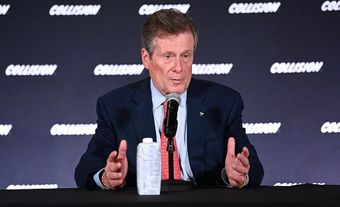

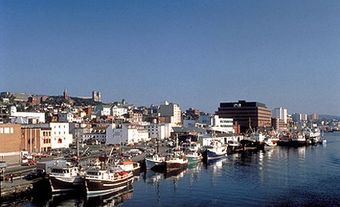
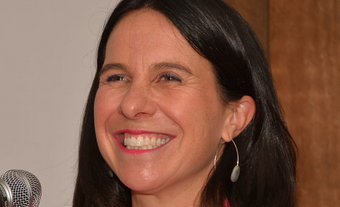
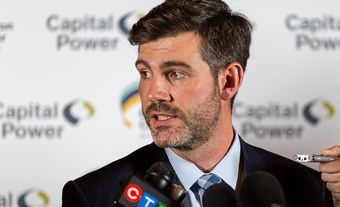
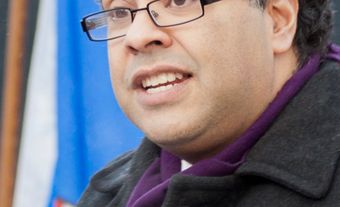
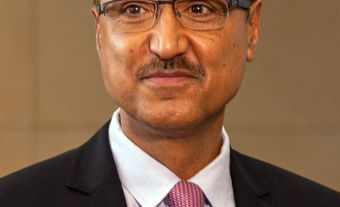
.jpg)